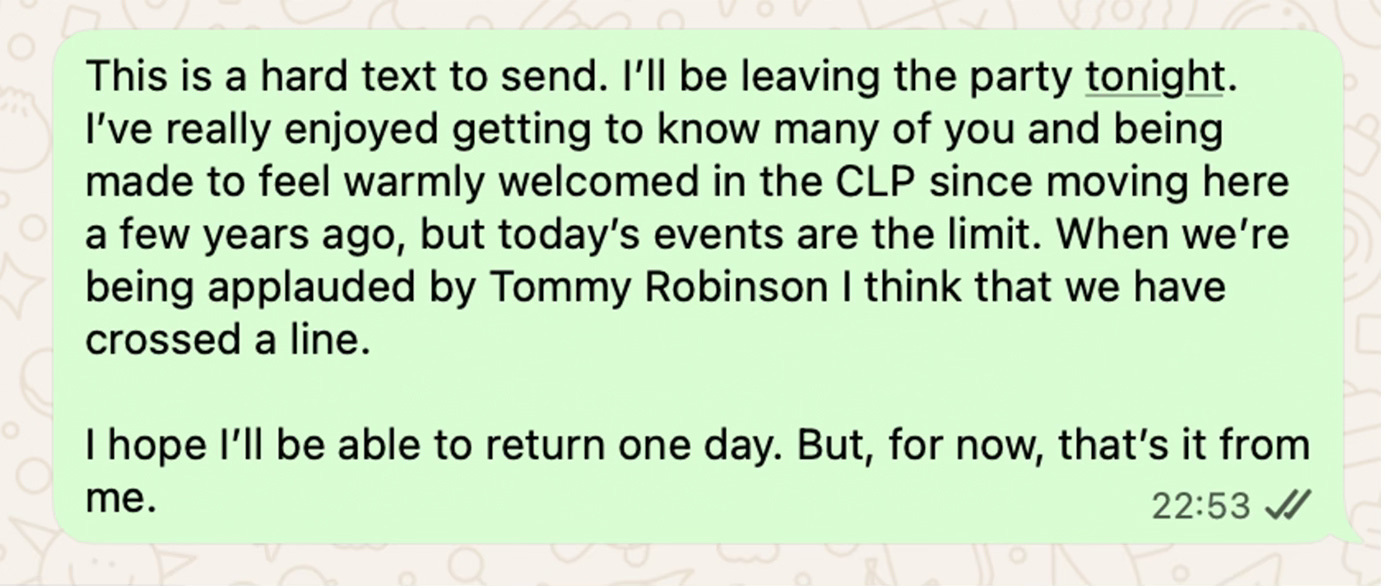Immigration and Abjection
There have to be red lines, this was mine.
This week I resigned from the Labour Party in disgust. I don’t reach for that shopworn and ignorable phrase, “resigned in disgust”, because it’s easy and I want to knock out a newsletter without too much effort; I use it because I don’t want more eye-catching language to obscure the simple, basic sensation that I experienced on Monday: disgust. Disgust and revulsion; perhaps that’s a better phrase, “resigned in revulsion”.
Late on Monday night, shortly after watching the self-abasement of yet another Labour point-person on TV, I posted a message to our CLP (Constituency Labour Party) Whatsapp group:
This is a hard text to send. I’ll be leaving the party tonight. I’ve really enjoyed getting to know many of you and being made to feel warmly welcomed in the CLP since moving here a few years ago, but today’s events are the limit. When we’re being applauded by Tommy Robinson I think that we have crossed a line.
I hope I’ll be able to return one day. But, for now, that’s it from me.
The one and only previous time that I revolted, disgusted, in a different CLP, I had been talked down by the MP Stella Creasy. That was in the high-heat of Corbyn Labour and what became known as the “antisemitism row”, but which I think is again better served by an older, shopworn phrase that more viscerally captures just how disgusting it was: “Jew-baiting”.
Like many in my party, my first response to the Jew-baiting had been to dismiss it as a transparent and defamatory Right-wing plot, and to reassure myself and others that it was inconceivable that we, the party of empathy and anti-Fascism, could ever be guilty of anything so crass and repugnant. Then came the wide-eyed disavowals from witnesses whom I knew - “no Elio, you’re wrong, it really is happening” - and the reports of Jewish members being called “Zios”, and of pop-up inquisitions in which demands were made of our comrades to identify themselves as “Zionists” or Israelis, and the disgusting episode in which a young, female, aide to the MP was called a “Zionist cum-bucket”, and the damning EHRC report, and the dear leader, Jeremy Corbyn, approving of a revolting image on social media in which naked black people are bent double while Jewish financiers play Monopoly on their backs.
Stella called me at home and received an appalled rant about the Jew-baiting and many other matters besides. “Don’t go”, she said, “stay in the party and fight to get it back. You can do more from inside”. And etcetera and so on with these types of arguments.
There is a symmetry to all this disgust, and revulsion and abhorrence; in both instances the animating quality was what everyone, everywhere now calls “populism”: the unsympathetic, incurious and stupid politics of them-and-us measured, always, against what Slavoj Žižek once described as “the low standards of common sense”. Back then it was Jew-baiting on the Left of the party, now it’s migrant-baiting on the Right.
On Saturday I had attended my last CLP meeting – the AGM. Labour had sent a rep from the regional party along (they’re clearly worried), someone asked about how best to counter the Reform-inspired lies and racism on social media, there was a discussion about effective rebuttal. Forty-eight hours later the Home Secretary climbed to her feet in Parliament and loudly endorsed all the Reform-inspired lies and racism on social media.
Shabana Mahmood’s statement proposed changes to asylum policy that are immoral, will be ineffective, and will further degrade our communities; Stella Creasy is one of those leading an admirable rearguard (alongside my current MP, Tony Vaughan, who has been excellent), and she has critiqued Mahmood’s plans in a Guardian article, I advise reading it.
Mahmood had trailed the statement in her own Guardian article, which had all the intellectual depth of Yoda’s “Fear is the path to the dark side. fear leads to anger, anger leads to hate, hate leads to suffering”, without showing any of the foundational political understanding that you must never, under any circumstances whatsoever, seek to appease the Far-Right, which can never be appeased. “Dark forces are stirring up anger in this country”, Mahmood wrote, “and seeking to turn that anger into hate”. Her statement in Parliament then outlined all the steps she intends to take in order to pander to these “dark forces”; the additional media briefing around the policy was particularly disgusting: how Britain will expropriate the property of refugees, how we will make them pay for sanctuary, how we will pull gold teeth at the border.
The Far-Right embarked on a victory lap, “Far more right wing than the Tories”, posted the influencer Carl Benjamin, “The Labour turn to the right is a godsend…not only will they establish the infrastructure for mass deportations, but they will have normalised it for the British public”.
My first documentary feature, The Asylum (2001), followed an Afghan family who had escaped the Taliban, been terrorised by people traffickers in Ukraine, and was trying to build a new life in Britain. When faced with deportation, the desperate father asked me whether, if he were to commit suicide, his wife and three young children might be given a reprieve; I was twenty-one years old, and I felt an absolute moral obligation to do everything that I could to help them. The threats of deportation had come during a characteristically spiteful campaign against asylum seekers in the Right-wing press, and at a time when the “dark forces” in the British National Party were gaining support. Migrant-baiting is not a new thing, it was happening ten years ago, at the time of the Brexit referendum, it was happening twenty-five years ago, when I was making The Asylum, and it was happening every decade before that.
Labour was in government in 2001, and certain voices on the right of the party started to advocate for harsher treatment of migrants; there was talk about abandoning the 1951 UN Convention on Refugees, and an opportunistic Conservative Party mobilised its favourite dehumanising language: “migrants flooding the country” etc.
I had managed to draft the support of the late Tony Benn in my campaign to prevent the deportation of the family in The Asylum, and Tony and I attended a meeting organised to defend refugees, where he was scheduled to speak. Together with the legal and moral arguments around the need to protect those fleeing from war and persecution, Tony warned against accepting any part of the Right’s xenophobia, which it disingenuously phrased as expressions of “concern” about migration. To do so, he said, would be to admit “Fascist ideas” into our politics, ideas which would gradually poison everything. And that is precisely what has happened.
By 2009 support for the BNP, a Neo-Nazi party, had ascended to a level at which the BBC’s public broadcasting mandate required it to invite the leader of the BNP, Nick Griffin, onto Question Time. This was seen at the time as such a transgressive development that there was a public debate about whether Griffin’s appearance could be prevented. When the broadcast eventually came, the atmosphere in the studio was sombre, the gravity of the event was recognised by the media, the panel of other speakers, from across the political class, united to marginalise Griffin and publicly denounce his views. Griffin was exposed as the petty Fascist that he was, and shortly thereafter the BNP ceased to exist as a meaningful political party.
This lesson in how to treat the Far-Right and populist nationalism was not well learned. A litany of catastrophic mistakes followed: David Cameron trying to neutralise UKIP via the Brexit referendum, Theresa May and Rishi Sunak trying to see off The Brexit Party, Reform, and all the other incarnations of populism by moving onto its territory, by admitting Fascist ideas. The consequence? The Conservative Party has been completely devoured by Reform, and Labour now faces the same annihilation.
The Fascist malignancy now suffuses our politics. In October this year the Conservative MP Katie Lam, spoken of as a potential future leader, gave an interview in which she said that thousands of people who are legally settled in the UK would be deported in order to make the country “culturally coherent”. This would, as far as we can tell, include my own father, who has been here since 1963 (far longer than Lam, whose blight on the nation only commenced in 1991, when she was born), has worked and paid taxes for decades, who has British children and grandchildren, but who is not himself British and therefore would, under Lam’s regime, be torn from his family, stripped of his rights, home and assets and be deported to a country in which he has never lived. This would apparently make Britain more “culturally coherent”, despite him having known no other culture for sixty- three years; again, Lam’s own experience of our culture only extends to thirty-four years.
Reporting on Lam failed to name her ideas, but they do have a name in longstanding: “remigration”. Remigration is the euphemistic term applied by the Neo-Nazi movement to describe the racist expulsion of anyone that it deems not to be “indigenous British”. To be clear: in 2009, Nick Griffin’s BNP considered this policy too extreme to be advocated in public; it is now a concept shamelessly expressed by a prospective leader of the Conservative Party. It is disgusting.
Shabana Mahmood, in standing at the dispatch box and validating the positions of the extreme Right, is the latest for whom the lessons of recent history remain obscure. The Labour Party, in chasing the votes of people who will not vote for it, abandons those who do; it profanes the principles of the Labour movement; it intensifies the extreme Right-wing venom that ravages our politics. The party leadership has to understand that this deranged nihilism will cost them more votes than they hope to gain, which is partly why I resigned. “Stay in the party and fight”? Not this time. There have to be some red lines, some dignity.
“I am the one who is regularly called a ‘Fucking Paki’ and told to ‘go back home’”, Mahmood replied to the spokesperson for the Lib Dems during Monday’s debate. I leave my former comrade with some parting advice: if someone calls you a “fucking Paki”, and tells you to “go back home”, you don’t tell that person that they’re right.






